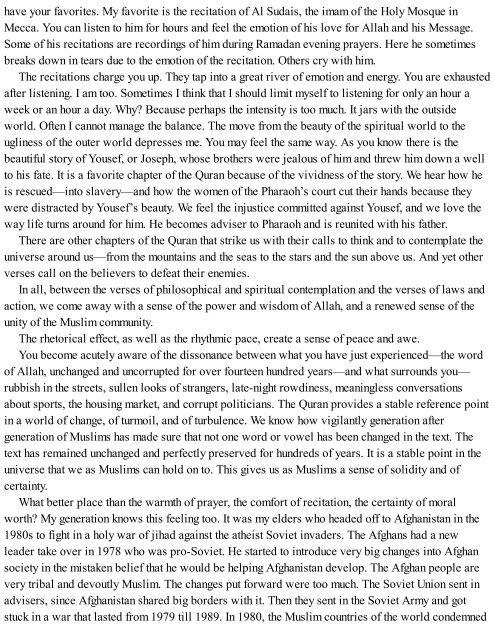1250119847
You also want an ePaper? Increase the reach of your titles
YUMPU automatically turns print PDFs into web optimized ePapers that Google loves.
have your favorites. My favorite is the recitation of Al Sudais, the imam of the Holy Mosque in<br />
Mecca. You can listen to him for hours and feel the emotion of his love for Allah and his Message.<br />
Some of his recitations are recordings of him during Ramadan evening prayers. Here he sometimes<br />
breaks down in tears due to the emotion of the recitation. Others cry with him.<br />
The recitations charge you up. They tap into a great river of emotion and energy. You are exhausted<br />
after listening. I am too. Sometimes I think that I should limit myself to listening for only an hour a<br />
week or an hour a day. Why? Because perhaps the intensity is too much. It jars with the outside<br />
world. Often I cannot manage the balance. The move from the beauty of the spiritual world to the<br />
ugliness of the outer world depresses me. You may feel the same way. As you know there is the<br />
beautiful story of Yousef, or Joseph, whose brothers were jealous of him and threw him down a well<br />
to his fate. It is a favorite chapter of the Quran because of the vividness of the story. We hear how he<br />
is rescued—into slavery—and how the women of the Pharaoh’s court cut their hands because they<br />
were distracted by Yousef’s beauty. We feel the injustice committed against Yousef, and we love the<br />
way life turns around for him. He becomes adviser to Pharaoh and is reunited with his father.<br />
There are other chapters of the Quran that strike us with their calls to think and to contemplate the<br />
universe around us—from the mountains and the seas to the stars and the sun above us. And yet other<br />
verses call on the believers to defeat their enemies.<br />
In all, between the verses of philosophical and spiritual contemplation and the verses of laws and<br />
action, we come away with a sense of the power and wisdom of Allah, and a renewed sense of the<br />
unity of the Muslim community.<br />
The rhetorical effect, as well as the rhythmic pace, create a sense of peace and awe.<br />
You become acutely aware of the dissonance between what you have just experienced—the word<br />
of Allah, unchanged and uncorrupted for over fourteen hundred years—and what surrounds you—<br />
rubbish in the streets, sullen looks of strangers, late-night rowdiness, meaningless conversations<br />
about sports, the housing market, and corrupt politicians. The Quran provides a stable reference point<br />
in a world of change, of turmoil, and of turbulence. We know how vigilantly generation after<br />
generation of Muslims has made sure that not one word or vowel has been changed in the text. The<br />
text has remained unchanged and perfectly preserved for hundreds of years. It is a stable point in the<br />
universe that we as Muslims can hold on to. This gives us as Muslims a sense of solidity and of<br />
certainty.<br />
What better place than the warmth of prayer, the comfort of recitation, the certainty of moral<br />
worth? My generation knows this feeling too. It was my elders who headed off to Afghanistan in the<br />
1980s to fight in a holy war of jihad against the atheist Soviet invaders. The Afghans had a new<br />
leader take over in 1978 who was pro-Soviet. He started to introduce very big changes into Afghan<br />
society in the mistaken belief that he would be helping Afghanistan develop. The Afghan people are<br />
very tribal and devoutly Muslim. The changes put forward were too much. The Soviet Union sent in<br />
advisers, since Afghanistan shared big borders with it. Then they sent in the Soviet Army and got<br />
stuck in a war that lasted from 1979 till 1989. In 1980, the Muslim countries of the world condemned
















